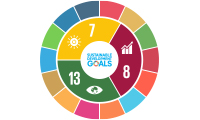Letter from the CEO

Welcome to Shell's Sustainability Report for 2018.
In my five years in this role I have worked to drive change for Shell and the industry as a whole. Change that puts us in a strong position to help society meet increasing energy demand while providing products with a lower carbon footprint.
Yet one area remains consistently essential to the way Shell does business. That is sustainability. We continue to put three things at the heart of our approach.
First, we aim to run a safe, responsible and profitable business. That means getting the basics right. One basic is doing no harm. For our industry, that means operating safely without hurting people or the environment. However, in 2018, there were two fatalities at Shell locations – one person died at a refinery in Germany and another at an onshore well in the USA. Every life lost is unacceptable. We must all work safely. In Nigeria, for example, a country that presents complex operating challenges, Shell companies there have sometimes struggled. In Groningen, in the Netherlands, we continue to work with others, including the government, to help people affected by earthquakes linked to our gas production activities. When we do not live up to the standards society expects, we must learn and repair any related damage.
We have also reflected deeply on the terrible road tanker incident in Pakistan in 2017. The tragedy, which was outside the scope of Shell’s operational control, underscored the need to consider how we can encourage effective health and safety standards in operations not under our control. Shell Pakistan Limited is currently contributing to long-term relief efforts for the families affected. Sadly, in October 2018 there was another roll-over incident in Pakistan involving a customer tanker, which resulted in the death of the relief driver and a spill. Events like these are a stark reminder that we must never forget the role that safety plays in our lives every day.
Second, to deliver energy products that people need and want – and do this responsibly to help shape a more sustainable energy future. People rely on the energy we produce to live their lives, in their homes and businesses, and for transport. We must be responsible stewards for these energy products. This means taking action on the greenhouse gas emissions associated with our energy products. Only by making relevant products responsibly can we be in business sustainably.
Third, to make a positive contribution to society. This means paying taxes, boosting local economies and developing talent, as well as investing in education to inspire new generations of people with innovative ideas. It is an effort that also includes helping to achieve universal access to clean, affordable energy, one of the UN’s 17 sustainable development goals. Part of this effort is the ambition we announced in 2018: to provide a reliable electricity supply to 100 million people in the developing world by 2030. We continue to work on developing a longer-term strategy to achieve this ambition.
This approach to sustainability provides the deep foundations we need to support our business strategy: to become – and remain – a world-class investment, to thrive through the transition to lower-carbon energy and to maintain a strong societal licence to operate.
The 2018 Sustainability Report, our 22nd such report, shows real action in the three parts of our approach to sustainability. It also includes details of our social, safety and environmental performance in 2018. Once again, I am grateful for the valuable input of the independent Report Review Panel, who help us provide more balanced, relevant and responsive reporting. As a founding member of the UN Global Compact, we also continue to support its corporate governance principles on human rights, environmental protection, anti-corruption and better labour practices.
This report shows much progress. But I believe we can do better. We must do the right thing on climate change, which means helping to reduce the environmental impact that comes with making our energy products.
If society is to meet the aims of the Paris Agreement, there is a lot of work to do to cut global greenhouse gas emissions while meeting rising demand for energy.
Shell’s ambition is to reduce the Net Carbon Footprint of the energy products we sell by around half by the middle of the century in step with society as it moves towards meeting the aims of Paris. We were the first international oil and gas company to set an ambition using a measure which includes our customers' emissions when they use the energy products we sell, as well as emissions from our operations and supply chains that bring these products to market. This also includes those emissions generated by third parties who supply energy and finished products to us. In 2018, we also announced we would set short-term Net Carbon Footprint targets. We linked a Net Carbon Footprint target and other measures to our executive remuneration starting in 2019, one year earlier than planned. To achieve our 2050 ambition, we will adapt and evolve over time the range of products we offer in line with our customers’ needs, increase the lower and zero emission energy products we offer, including natural gas, biofuels and renewable power.
We will also be working increasingly with nature, such as forests and wetlands, and progressing carbon capture and storage to create sinks for those emissions that are hard to avoid.
And we are working on making our own operations more efficient. In our natural gas production and processing, this means limiting leaks of methane, a potent greenhouse gas. To do this, in 2018 we launched a drive to improve the data we gather on our own operational methane leaks and set a methane intensity target. We are also finding better ways to detect and repair methane leaks in our operations.
The Net Carbon Footprint ambition will help ensure our relevance and resilience in the energy system of the future, which is crucial to being a world-class investment over the long term.
In this report you will find details of the actions we are taking to operate safely, to respect the environment and to work closely with communities. There is detail on our drive to build on our solid financial foundations guided by our business strategy, which will help us navigate through all the change to come.
In a time of constant change, keeping sustainability as the consistent bedrock of our approach to doing business is not only right for society. It will be critically important to Shell’s success.

Ben van Beurden
Chief Executive Officer
 Our people
Our people
 Sustainable development goals
Sustainable development goals
 About our data
About our data
 Electricity
Electricity